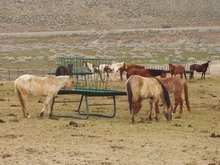Back in February, President Obama nominated Sally Jewell to be the next secretary of the interior. Jewell is an interesting choice. She is the CEO of REI, the outdoor recreational equipment retailer.

Wild horses in BLM holding pen
Incoming Interior Secretary Sally Jewell has promised to strike a better balance between the competing interests of industry and environmental protection, and she could literally determine whether America's wild horses have a future on public lands in the West.
© 2013 by Peter Schmalzer
She has no political experience, but according to the Denver Post, she did spend five weeks hiking in Antarctica in 2011, climbing some of the continentâs most treacherous peaks.
Jewell would replace Ken Salazar, who has announced he would not stay for Obama's second term. She is the first woman Obama has announced for his second-term cabinet.
An outdoors enthusiast, Jewell received the 2009 National Audubon Society Rachel Carson Award for her leadership in and dedication to conservation. She enjoys running, skiing, climbing, sailing, and biking, and likes to bike to work.
Incoming Interior Secretary Sally Jewell has promised in her confirmation hearing to strike a better balance between the competing interests of industry and environmental protection. Her success - or failure - could literally determine whether America's iconic wild horses have a future on public lands in the West.
Responsibility for managing the nation's wild horses and burros lies with the Bureau of Land Management (BLM), an agency of the Interior Department. For four decades, the BLM - an agency operated by and for the livestock industry - has waged a war on America's wild horses.
The ranchers who influence BLM policy view wild horses as competition for cheap, taxpayer-subsidized livestock grazing on public lands. They want them gone, and the BLM has been only too happy to comply.
Using low-flying helicopters to stampede and round up wild horses, the federal government removes them by the thousands from public lands in the West each year.
Once removed, the horses are warehoused in holding facilities. The BLM now stockpiles an astounding 50,000 wild horses in government holding facilities. By contrast, fewer than 32,000 remain free on the range.
The BLM's approach is costly, both to the taxpayers and to the horses, who lose their freedom and families, and sometimes their lives. As the pace of the roundups has accelerated, the cost of the federal wild horse program has doubled, from $40.6 million in 2009 to $78 million this fiscal year.
Taxpayers are on the hook for $108,117 every day just to feed the stockpiled horses. And that doesn't take into consideration the estimated $500 million annual cost to American taxpayers for subsidizing the welfare ranching system that is driving wild horses from the range in the first place!
Wild horse advocates see no question about the endgame of this unsustainable approach to wild horse management: to manufacture a crisis in which slaughter becomes the only possible economic solution.But Americans don't eat horses and with the hullabaloo about horsemeat being passed off as beef in European countries, has attached a stigma to the subject.
Americans overwhelmingly oppose horse slaughter, and the BLM denies slaughter is the goal. But it's already happened with the sale of "truckload after truckload" of captured mustangs to a known kill buyer, Tom Davis.
This is a solvable issue. Proven alternatives like better uses of fertility control would save money and keep wild horses where they belong: on the range. This is the course our government should be pursuing for its wild horse program.
As an outdoor enthusiast and former CEO of REI, Jewell recognizes the economic benefits of the multi-billion-dollar-a-year outdoor recreation industry. She knows that protection of natural resources is vital to this growing segment of our economy.
Will she achieve a better balance between the livestock, oil/gas, mining and other industries that exploit our public lands and the protection of the environment? Will she deliver necessary cultural change to an agency that treats wild horses as pests to be hunted down with helicopters, rather than natural resources to be protected for future generations?
The answers to these questions are unknown at this point. What we do know is that wild horses are making their last stand in the American West.
But, perhaps there is some hope: âWhen it was Jewellâs job to stand up for outdoor recreation, she did so, not only running her company but also lending public and financial support to the Outdoor Industry Association as well as to politicians who back its causes. When her job becomes managing all those public lands for the good of the American people as a whole, there is no reason to worry that she wonât do that just as well.â Salt Lake Tribune, Feb. 14, 2013.
